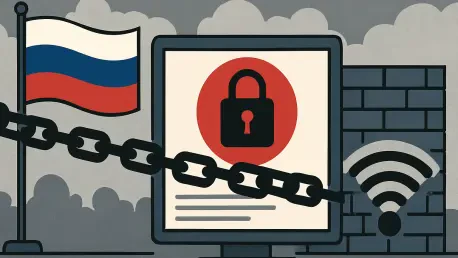In an era where the internet serves as a global conduit for information and expression, the digital landscape in Russia, often referred to as RuNet, has undergone a dramatic transformation into a tightly controlled space under state dominance. Over recent years, the Russian government has deployed a multifaceted strategy involving legislation, advanced technology, and infrastructure overhauls to censor content, throttle access, and isolate its internet from the global network. This shift, rooted in policies like the 2019 “sovereign internet” law, has not only restricted millions of Russians from accessing unbiased information but has also set a troubling precedent for digital rights worldwide. The intensification of these measures following the full-scale invasion of Ukraine in 2022 marks a pivotal escalation, as the state seeks to silence dissent and shape narratives that align with its interests. Human Rights Watch and other monitoring bodies have documented this crackdown, revealing a calculated agenda to sever connections with the outside digital world while imposing severe limitations on freedom of expression, privacy, and access to information. This exploration delves into the mechanisms behind this control, the human cost for users, the role of technology companies, and the broader implications for global internet freedom, painting a comprehensive picture of a digital environment under siege.
Legal Framework for Internet Control
The “Sovereign Internet” Law of 2019
The cornerstone of Russia’s internet governance strategy, enacted in 2019, is a piece of legislation officially framed as a protective measure against external cyber threats, but in practice, it has become a powerful instrument for internal suppression. Known as the “sovereign internet” law, it grants the government sweeping authority to manage RuNet by mandating the installation of state-controlled equipment within internet service provider (ISP) networks. This equipment enables authorities to filter and manipulate traffic at will, often without transparency or accountability. Far from safeguarding national security, the law has facilitated widespread censorship by allowing the state to sever connections to the global internet during perceived crises. Roskomnadzor, the state communications watchdog, oversees this system, ensuring that ISPs comply with directives to block or restrict content deemed undesirable by the Kremlin. The law’s implications extend beyond mere technical control, as it lays the groundwork for a digital environment where state interests override individual freedoms, fundamentally altering how Russians interact with online spaces.
Beyond its initial framework, this legislation introduced a paradigm shift by centralizing internet governance under state oversight, a move that has drawn sharp criticism from digital rights advocates. The requirement for ISPs to install state-managed hardware, often referred to as “black boxes,” means that traffic can be monitored and redirected without public knowledge, raising significant privacy concerns. Additionally, the law empowers the government to conduct isolation drills, testing RuNet’s ability to function independently from global networks. These exercises, while presented as security measures, often result in unexpected disruptions for users, highlighting the law’s broader impact on daily digital life. Human rights organizations have pointed out that such unchecked power lacks judicial oversight, leaving little room for users or companies to challenge arbitrary restrictions. This legal foundation not only enables censorship but also sets a precedent for other authoritarian regimes to emulate, posing a threat to the open nature of the internet globally.
Subsequent Amendments and Policies
Since the introduction of the 2019 law, a series of amendments and related policies have further tightened the state’s grip on digital communications, creating a complex web of regulations designed to enforce compliance. Updates to the Law on Information have imposed stringent requirements on tech companies and social media platforms to proactively censor content that authorities label as offensive or threatening to public order. These vague criteria often target criticism of the government, especially content related to the conflict in Ukraine since 2022. Additionally, anti-terrorism legislation, such as the Yarovaya Law, compels firms to store user data locally and disclose it to law enforcement on demand, amplifying surveillance capabilities. Non-compliance carries severe penalties, including hefty fines and potential criminal charges, ensuring that ISPs and tech entities fall in line with state mandates. This evolving legal landscape reflects a deliberate effort to eliminate dissent by controlling the flow of information at every level of the digital ecosystem.
Moreover, these subsequent policies have expanded the scope of state intervention by targeting smaller ISPs and hosting providers, forcing them to integrate with larger, state-affiliated networks. Amendments introduced in recent years require high-speed ISPs to seek government approval for equipment placement, ensuring all significant traffic passes through monitored channels. Such measures have effectively reduced the autonomy of private entities in RuNet, consolidating control in the hands of a few state-aligned operators. The punitive consequences for non-compliance, which can include business shutdowns, create an environment of fear and coercion. Digital rights experts argue that this legal overreach lacks proportionality and transparency, violating international standards for freedom of expression. As these policies continue to evolve, they reinforce a system where the state not only dictates what can be accessed online but also who can operate within the digital sphere, deepening the isolation of RuNet.
Technological Mechanisms of Censorship
Tools like TSPU and Deep Packet Inspection
At the heart of Russia’s censorship apparatus lies advanced technology such as the “Technological Means for Countering Threats” (TSPU) equipment, a state-managed system installed across most ISP networks to centralize control over internet traffic. TSPU utilizes deep packet inspection (DPI), a method that analyzes data packets as they travel through networks, enabling authorities to identify and block specific content, applications, or protocols in real time. Managed by Roskomnadzor, this system connects to a registry of banned websites, automatically redirecting users to error pages when accessing prohibited material. Beyond mere blocking, DPI’s ability to scrutinize unencrypted data raises alarming privacy concerns, as it potentially exposes personal communications to state surveillance. The deployment of such invasive tools marks a shift from decentralized censorship to a uniform, state-driven approach, ensuring that no corner of RuNet escapes government oversight.
Furthermore, the sophistication of TSPU extends to software like EcoSGE, which enhances filtering capabilities by redirecting traffic and potentially intercepting data through features documented in its manuals. While authorities claim these tools are necessary to counter cyber threats, digital rights advocates argue they are primarily used to suppress dissent and control narratives, particularly since the Ukraine conflict intensified in 2022. The inconsistent application of TSPU across regions, as reported by monitoring projects, means that access restrictions can vary unpredictably, complicating efforts to develop effective circumvention methods. This technological framework not only restricts access to information but also creates an atmosphere of uncertainty for users, who may never know when or why their online activities are being monitored or blocked. The pervasive use of DPI underscores the invasive nature of state control, challenging the very notion of a free and open internet within Russia’s borders.
Blocking and Throttling Tactics
The scope of Russia’s censorship is vividly illustrated through the widespread blocking and throttling of foreign platforms and independent media, a tactic that has surged since the onset of the Ukraine conflict in 2022. Major social media outlets like Twitter (now X), Facebook, and Instagram have faced outright bans or severe restrictions for refusing to comply with state demands to remove content critical of the government. YouTube, while still accessible, often experiences deliberate slowdowns, a practice known as throttling, designed to frustrate users and push them toward state-approved alternatives like VKontakte (VK). Reports indicate that over 236,000 sources have been blocked for allegedly spreading “fake news” about the war, encompassing independent news outlets, human rights websites, and opposition voices. This aggressive approach seeks to eliminate alternative perspectives, ensuring that only state-sanctioned narratives dominate the digital space.
In addition to outright bans, throttling serves as a subtler yet equally effective method to control user behavior by making access to certain platforms painfully slow or unreliable. This tactic not only discourages engagement with foreign content but also nudges users toward domestic platforms that align with government interests, such as Yandex for search or VK for social networking. The impact of these restrictions is compounded by the lack of transparency, as many blocks occur without public acknowledgment or justification, leaving users unaware of why specific content is inaccessible. Digital rights monitors have noted that such practices disproportionately affect younger, tech-savvy demographics who rely on global platforms for information and communication. By systematically targeting these channels, the state aims to reshape public perception, creating a digital echo chamber where dissent struggles to find an audience amid the noise of state-approved content.
Targeting Circumvention Tools
Efforts to bypass censorship through tools like Virtual Private Networks (VPNs) have become a critical battleground, with Russian authorities intensifying their crackdown on such services in recent years. By late 2024, nearly 200 VPN services had been blocked, and the state has banned the dissemination of information about how to use these tools, severely limiting options for users seeking to access restricted content. TSPU equipment plays a pivotal role in this effort by targeting specific VPN protocols, rendering many services ineffective and making circumvention a technical challenge even for savvy users. This systematic suppression reflects a broader intent to ensure that independent information remains out of reach for the majority of the population, particularly those without advanced technical knowledge.
The implications of this crackdown extend beyond mere access restrictions, as it isolates millions of Russians from global discourse and alternative viewpoints, especially on sensitive issues like the Ukraine conflict. Studies suggest that roughly half of the population lacks the expertise to navigate around these blocks, leaving them confined to a curated digital environment of state-approved content. Moreover, the legal risks associated with using or promoting VPNs create a chilling effect, discouraging even those capable of circumvention from attempting to do so. The state’s focus on eliminating these tools is not merely technical but deeply political, aiming to prevent exposure to narratives that challenge official rhetoric. As access to circumvention methods dwindles, the digital divide within Russia grows, with profound consequences for freedom of information and the ability to engage with the world beyond state-imposed boundaries.
Impact on Users and Digital Rights
Restrictions on Freedom of Expression
The cumulative effect of Russia’s internet censorship policies has been a profound erosion of freedom of expression, a fundamental right now under constant threat within RuNet. With independent media outlets and foreign social media platforms either blocked or throttled, millions of users find themselves unable to access unbiased information or voice dissenting opinions without fear of reprisal. Since 2022, the blocking of over 400 news websites, alongside platforms like Instagram and Facebook, has silenced critical voices, particularly those reporting on the Ukraine conflict from non-state perspectives. This deliberate suppression ensures that public discourse is dominated by government-approved narratives, leaving little space for debate or alternative viewpoints. For many Russians, the internet—once a bastion of free expression—has become a tightly controlled space where self-censorship is often the safest option.
Beyond the immediate loss of access, the psychological impact of living in a digitally surveilled environment cannot be understated, as users grapple with the constant awareness that their online activities may be monitored or restricted. The fear of repercussions for engaging with banned content or expressing controversial opinions fosters an atmosphere of caution, stifling creativity and open dialogue. Digital rights advocates have highlighted that this environment disproportionately affects activists, journalists, and opposition figures who rely on online platforms to mobilize and inform. The absence of legal recourse to challenge arbitrary blocks further compounds the issue, as users are left powerless against state overreach. This restriction on free speech not only undermines individual rights but also diminishes the diversity of thought necessary for a vibrant, democratic society, trapping users in a digital landscape shaped by state interests.
Economic and Social Disruptions
Internet censorship in Russia extends its impact beyond expression, causing significant economic and social disruptions that affect the daily lives of ordinary citizens. Internet shutdowns, often implemented without notice during political events like protests or elections, sever access to essential services such as online banking, e-commerce platforms, and communication tools. These disruptions, sometimes lasting hours or days, have been documented during high-profile incidents, including opposition gatherings and regional unrest, where messaging apps like Telegram and WhatsApp are frequently targeted. The collateral damage from such measures often spills over into unrelated sectors, with businesses unable to process transactions and individuals cut off from critical information, illustrating the far-reaching consequences of state control over digital infrastructure.
Additionally, the broader economic fallout from internet isolation poses a growing challenge for Russia’s digital economy, as global connectivity becomes increasingly difficult for enterprises and entrepreneurs. Small businesses that rely on foreign platforms for marketing or customer engagement find their operations hampered by blocks and slowdowns, while international sanctions compound the difficulty of accessing global markets. Socially, the restrictions disrupt personal connections, as many Russians can no longer use popular global platforms to communicate with friends and family abroad. The resulting isolation fosters a sense of disconnection from the international community, exacerbating feelings of alienation. Reports from human rights groups underscore that these disruptions violate not just economic rights but also the social fabric, as access to a free and open internet is integral to modern life. The ripple effects of these policies highlight how digital control transcends ideology, impacting the practical realities of survival and interaction.
Role of Technology Companies
Compliance by Russian Firms
Russian technology companies, such as VKontakte (VK) and Yandex, operate within a landscape of intense state pressure, often aligning with government demands to censor content and promote official narratives. As domestically based entities, these firms are subject to direct oversight by authorities, leading to proactive measures like blocking independent media or deleting content deemed offensive to the state. Since the escalation of the Ukraine conflict in 2022, VK has been documented removing posts critical of the military, while Yandex has adjusted search results to prioritize state-approved sources. Responses from these companies to inquiries by rights organizations often reflect a cautious adherence to local laws, with claims of challenging overbroad requests, though evidence suggests a pattern of compliance that facilitates state propaganda. This alignment underscores their role as extensions of governmental control within RuNet.
The implications of such compliance are significant, as these platforms shape the information environment for millions of users who have few alternatives due to blocks on foreign services. By promoting state narratives, VK and Yandex contribute to a digital echo chamber where dissenting voices struggle to gain traction, effectively reinforcing the Kremlin’s grip on public opinion. This dynamic is particularly evident in how these firms handle content related to political opposition or international criticism, often preemptively censoring material to avoid state penalties. Digital rights monitors argue that this complicity not only undermines user trust but also sets a dangerous precedent for tech companies globally, normalizing state-driven censorship under the guise of legal obligation. The behavior of Russian firms highlights a critical tension between business interests and ethical responsibilities in an authoritarian digital landscape.
Challenges for Foreign Companies
Foreign technology companies, including giants like Google, Apple, and Mozilla, face immense pressure to comply with Russia’s censorship demands, navigating a complex terrain of ethical dilemmas and market considerations. Since 2022, authorities have demanded the removal of VPN apps, independent news content, and material critical of the government from app stores and platforms, often under the threat of fines or outright bans. Non-compliance has led to significant disruptions, with services like YouTube experiencing throttling and Cloudflare-linked websites facing collateral blocking due to state intervention. These companies must weigh the risk of losing access to the Russian market against the moral implications of aiding censorship, a decision that impacts millions of users reliant on their services for information and communication. The opaque nature of state demands further complicates their position, as many restrictions are implemented without formal acknowledgment.
The broader consequences of these challenges reveal a stark reality for foreign firms, as their decisions ripple across the digital ecosystem, affecting user access to global information. For instance, when Apple and Google comply by removing certain apps from their stores, they inadvertently limit tools that Russians use to bypass censorship, further isolating them from independent content. Conversely, resistance to state pressure often results in retaliatory measures, such as service slowdowns or legal actions, which harm users just as much as compliance does. Digital rights advocates have criticized overcompliance by some firms, arguing that it exacerbates human rights violations by enabling state control. The delicate balance foreign companies must strike underscores the global stakes of internet governance, as their actions in Russia could influence how they respond to similar pressures in other restrictive regimes, shaping the future of digital freedom worldwide.
International Implications and Human Rights Violations
Violation of Global Standards
Russia’s internet censorship policies stand in stark violation of international human rights standards, drawing widespread condemnation from global bodies and legal experts. These measures contravene obligations under the International Covenant on Civil and Political Rights (ICCPR), to which Russia is a signatory, by arbitrarily restricting freedom of expression, access to information, and privacy. The United Nations and the European Court of Human Rights have repeatedly criticized practices like mass surveillance, internet shutdowns, and content blocking for lacking legality, necessity, and proportionality—key principles required for any limitation on rights. Rulings and statements from these institutions emphasize that internet access is integral to exercising fundamental freedoms, and Russia’s non-transparent, overly broad restrictions fail to meet justifiable criteria, even under claims of national security. This systemic disregard for global norms highlights a broader erosion of digital rights within the country.
The specifics of these violations are evident in the mechanisms of control, such as the use of TSPU equipment for unaccountable censorship and the targeting of VPNs to prevent circumvention. Human rights monitors have documented how these actions disproportionately impact vulnerable groups, including journalists and activists, who face heightened risks of surveillance and prosecution for online activities. The absence of independent oversight or legal recourse for affected users further aggravates the issue, as there is no mechanism to challenge state decisions on blocking or shutdowns. International criticism also points to the chilling effect on free speech, as fear of repercussions deters open discourse. This pattern of abuse not only undermines Russia’s commitments under international law but also sets a troubling example for other nations, challenging the global consensus on internet freedom as a cornerstone of human rights in the digital age.
Global Risks of RuNet Isolation
The isolation of RuNet carries significant risks for the global internet, as Russia’s model of state-controlled digital spaces could inspire other authoritarian regimes to adopt similar strategies, fragmenting the once-unified network. By creating a self-contained internet through nationalized infrastructure, state-managed domain systems, and forced reliance on domestic platforms, Russia demonstrates a blueprint for digital autarky that prioritizes control over openness. This approach threatens the foundational principle of a borderless internet, raising alarms among policymakers and digital rights advocates who fear a domino effect in regions with emerging authoritarian tendencies. If replicated, such policies could lead to a splintered digital landscape where national internets operate under strict governmental oversight, stifling cross-border communication and collaboration essential for global progress.
Moreover, the precedent set by Russia’s actions poses challenges for foreign governments and international organizations striving to balance sanctions with the need to maintain information access for Russian citizens. Overcompliance by tech companies or overly broad punitive measures risk further isolating users who depend on global platforms for independent news, exacerbating human rights issues. The potential for other states to emulate this isolationist model heightens concerns about a future where internet freedom becomes a patchwork of national controls rather than a universal right. Addressing this trend requires coordinated international efforts to reinforce open internet principles and support tools that enable access despite state barriers. The stakes extend beyond Russia’s borders, as the outcome of this digital struggle could shape the trajectory of global connectivity, determining whether the internet remains a shared resource or devolves into a series of walled gardens dictated by state power.
Reflecting on Digital Barriers
In today’s increasingly connected world, digital barriers continue to impact access to technology and information, creating significant challenges for many individuals and communities across the globe. These barriers often manifest as limited internet access, outdated hardware, or a lack of digital literacy skills.
Looking back, the trajectory of internet censorship in Russia revealed a calculated and relentless push to transform RuNet into a state-dominated enclave, where legislative tools, invasive technologies, and infrastructural overhauls converged to suppress dissent and sever global ties. The “sovereign internet” law of 2019, alongside subsequent policies, provided the legal scaffolding for this control, while tools like TSPU and deep packet inspection enabled unprecedented surveillance and blocking. The human toll was evident as millions faced restricted access to information, economic disruptions, and social isolation, compounded by the complicity or coercion of tech companies navigating state demands. Internationally, these actions stood as stark violations of human rights norms, drawing condemnation for their disregard of fundamental freedoms.
Moving forward, addressing this digital quagmire demands a comprehensive approach that balances innovation with consumer protection, ensuring that the rapidly evolving landscape of technology does not outpace the necessary regulatory frameworks to safeguard users and maintain stability in the market.









